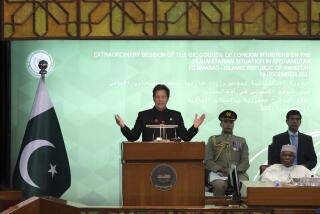U.S. envoy praises Pakistan’s campaign against militants
- Share via
ISLAMABAD, PAKISTAN — This war-ravaged nation has turned a corner and is now serious about crushing the Pakistani Taliban, U.S. special envoy Richard Holbrooke said Friday, yet the need is also growing for displaced Pakistanis to return home and rebuild their lives.
Ending a three-day visit to Pakistan, Holbrooke, the Obama administration’s envoy for Afghanistan and Pakistan, said he saw a population that fully grasps the gravity of the threat posed by Taliban militancy -- a dramatic shift, he said, from how people here previously viewed the issue.
And though the U.S. has criticized the military for lacking resolve in combating militants, Holbrooke said he was convinced that Pakistan’s leaders and commanders were intent on completely eliminating Taliban fighters.
But Holbrooke said gains can be lasting only if Pakistan and the international community focus on the next crucial phase -- reconstruction -- so the estimated 3 million people displaced by the fighting can return safely to the lives they once led.
“The real test is how quickly the refugees will be able to get back to their homes,” Holbrooke said at a news conference here in the Pakistani capital. “The reconstruction bill will be very large, at least as large as the humanitarian bill that we are facing now. But having turned the corner, it’s going to be essential to consolidate the gains.”
The challenges Pakistan will face as it embarks on the task of returning normality to people’s lives were underscored Friday afternoon, when a suicide bomb attack killed 38 people gathered at a mosque in the volatile Upper Dir district.
It was a sober reminder that violence has not waned despite sizable military gains against the Taliban militants. Moreover, efforts to return the displaced to their hometowns and restore physical and social infrastructure are likely to be hindered by suicide bombings and ambushes on police. The bomber detonated the explosives outside a mosque in the village of Hayagay Shergi as worshipers were preparing to go inside for prayers, residents said. At least 14 of the 38 killed were children, local authorities said; 14 people were injured.
Two months ago, tribal elders organized a militia to oust Taliban fighters from the area, residents said.
The attack occurred a day after security forces arrested three aides of Sufi Mohammed, a radical cleric whose son-in-law is Maulana Qazi Fazlullah, the local Taliban’s leader in Swat, who remains at large.
Mohammed helped broker a deal in February with Pakistani officials in which authorities agreed to allow imposition of Sharia, or Islamic law, in Swat if the militants laid down their arms. Later, Taliban fighters reneged, and expanded their reach into the adjacent Buner district, just 60 miles from Islamabad. That move prompted the military offensive.
Those arrested during a raid on a madrasa near Swat were Mohammed’s deputy, Maulana Alam, his spokesman, Ameer Izzat Khan, and another aide, Syed Wahab. Earlier reports suggested that Mohammed was also arrested, but Pakistani officials said he was not.
Holbrooke’s visit to Pakistan included meetings with President Asif Ali Zardari, Prime Minister Yusaf Raza Gillani, military commanders and opposition leader Nawaz Sharif. He said the talks focused on the importance of returning people to their homes.
“We’ve all seen refugee camps that start out as tent cities and harden into permanent towns and villages,” Holbrooke said. “This cannot happen here. These people . . . want to go home. They have their land, their shops, and the quicker they get home, the better.”
Holbrooke said that rebuilding would cost at least as much as the price tag for coping with the flood of people fleeing the fighting, which the United Nations has characterized as one of the largest population displacements in recent years. Holbrooke said the U.N. high commissioner for refugees, Antonio Guterres, told him that reconstruction in areas of Swat and nearby districts could cost $500 million to $1 billion. That money, Holbrooke said, would have to come from the international community.
“Having turned the corner, it’s essential to consolidate the gains,” Holbrooke said. “That’s going to be a difficult and expensive proposition.”
--
Special correspondent Zulfiqar Ali in Peshawar, Pakistan, contributed to this report.
More to Read
Sign up for Essential California
The most important California stories and recommendations in your inbox every morning.
You may occasionally receive promotional content from the Los Angeles Times.










